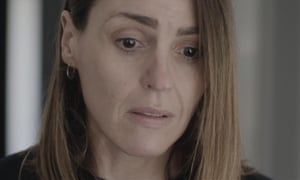I Am Victoria review – a masterclass in what pushes a woman to the edge
In the new series of Dominic Savage’s searingly truthful dramas, Suranne Jones plays a mother trying to do it all … and hurtling towards a meltdown

Two years ago, Channel 4 gave us the novel – not unprecedented, but still novel – series I Am … It comprised three dramas created, written and directed by Dominic Savage, who devised the stories with three female actors. I Am Nicola starred Vicky McClure as a woman realising she is in a coercively controlling relationship and trying to find a way out. Samantha Morton was the protagonist in I Am Kirsty, hemmed in by poverty and predated upon for all the vulnerabilities that go with that. Gemma Chan was in I Am Hannah, about a young woman appraising everyone’s interest in her biological clock.
There were moments when polemic overwhelmed the storytelling, but overall (and the Nicola instalment in particular) they were strikingly truthful stories told in a strikingly truthful way. I loved what they did and what they represented – a fine, new way to get women’s real lives and experiences on screen. Savage seemed to have got himself brilliantly out of the way, committed himself fully to that goal and succeeded.
Now a second series is here with no less power or commitment. Suranne Jones launches proceedings in I Am Victoria. She is a brittle, perfectionist mother of two, married to Chris, and trying to complete an important property development that will bring her advancement, and them all financial security. By the time we see her she is clearly on the edge of a meltdown and, over the swiftly moving hour, we see, as she inches ever closer to the brink, why.
The beauty of it is that there is no major reason. Some of it is temperament and some of the pressures she feels could be deemed self-inflicted – the home that has to be immaculate, the exercise, the children who must be changed out of leggings into proper clothes before they go to the shops, and so on. But there are suggestions she grew up far less affluent than she is now and that this drive enables her to outrun demons.
Then there are the outside pressures. The aimless sister (Alice Feetham, nailing a small but powerful part) who repeatedly asks for handouts and bites back viciously when even semi-thwarted. As with the previous series, the arguments are so realistic you almost flinch as they circle each other, finding – as only sisters or (in the new series’ third episode, starring a remarkable Lesley Manville) spouses can – the rawest nerve and striking it without mercy. There’s also the good husband, Chris (Ashley Walters), who nevertheless can’t leave her alone for long enough for her to get all she needs to get done done. “I said,” she explains when he interrupts her at her desk after the family breakfast she scheduled and cooked, to urge her to spend more time with them, “that I just need half an hour more. That’s why I got up at 6am … Then I can come back into family life.”
It’s a perfect portrait of a woman at a certain stage in life, when her resources are being depleted by the accumulated burdens faster than they can be restored (though a little more shading in of her background would have brought it even more into focus). It is a perfect portrait of the thousand and one daily frustrations, erosions of autonomy and subordinations of the self that are – I would argue – the overwhelmingly female, middle-aged experience. Savage’s script and Jones’s performance – not just in the silent screams but in the gulps of air out of the cracked window, her hand catching at the breeze – captures it all so exquisitely it’s painful.
The second outing – I Am Danielle, starring Bafta-winner Letitia Wright – doesn’t feel quite as sure of its ground and therefore is less convincing, but the final with Manville is another masterclass. In many ways she is Victoria 20 years on, and if a dozen of the lines don’t skewer you through the heart with their furious veracity – well, I would have to imagine you are either very young or very lucky.
When the history of female rage is finally written I hope Savage and his collaborators get an honourable mention in one of its many, many volumes. For nobody on television has, as far as I am aware, captured it better.



